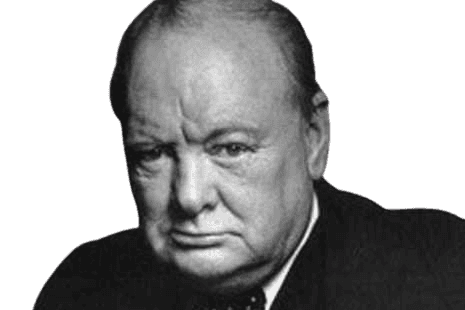Life and achievements
Early life
Winston Churchill was born on November 30, 1874, at the Palace of Blenheim. His parents were Lord Randolph Churchill and Jennie Jerome. Although he came from a well-off family and attended Harrow School, he was not a good student. However, his great interest in history and English led him to become a writer.
Following his time at Harrow, Churchill went on to the Royal Military College at Sandhurst and did well, finishing eighth in his class. He was appointed a second lieutenant and posted to the 4th Queen’s Own Hussars, where he was to fight in British India and Sudan. He became a national hero after fighting in the Second Boer War, being a war correspondent, and escaping from a POW camp.
Churchill’s political career started in 1900 when he was elected the Conservative Member of Parliament for Oldham. However, he was unhappy with the party’s position on free trade and joined the Liberal Party in 1904. He quickly climbed the ladder within the Liberal government and was made the President of the Board of Trade and later the Home Secretary, where he introduced many social reforms.
In 1911, Churchill was appointed as First Lord of the Admiralty and was responsible for the Royal Navy in the initial phase of the First World War; the disastrous Gallipoli Campaign brought his downfall, and he resigned from the government and was out of active politics for some time. He was a lieutenant colonel of the Royal Scots Fusiliers and served on the Western Front for six months, leaving him a changed man.
Legacy
Winston Churchill is a man of many parts: a war leader, a statesman, and a writer. He was a great leader during the Second World War; his speeches inspired the British people and gave them something to look forward to during the worst of the war. Churchill’s idea of a united Europe and his early support for forming the United Nations were proof of his progressive thinking in conducting relations with other nations.
However, after the war, Churchill did not cease from participating in world politics. In his Iron Curtain speech in 1946, Churchill articulated the conflict between the Western Allies and the Soviet Union, thus signaling the start of the Cold War. He was the Prime Minister of Britain between 1951 and 1955. His leadership was characterized by the post-war reconstruction process and decolonization, even though his second term was less effective than his first one during the war.
Churchill’s literary works are also one of the aspects that define his legacy. He was awarded the Nobel Prize in Literature in 1953 for his historical output, including the monumental works on the Second World War and the biography of his relative, the Duke of Marlborough. These works are still popular and provide the author’s view on history and politics.
Aside from his political and literary accomplishments, the people’s resilience and never-say-die spirit of Churchill are immeasurable. His personal and political triumphs, humor, and speeches are still relevant to leaders and people of the world. His state funeral held in 1965 clearly indicated his influence as world leaders turned out in their numbers to pay their respects.
Milestone moments
Nov 21, 1899
Breaking Out of a Boer War Prisoner of War Camp
During the Second Boer War in November 1899, Churchill was captured by the Boers and was a prisoner of war in Pretoria, South Africa.
He was a brave and clever man who, despite being a prisoner of war, was able to free himself, get out of the camp, and cross almost 300 miles to freedom.
It made him a national hero and increased his popularity and recognition.
The British media reported on his actions, and therefore, he was seen as a hero and a very determined man.
Churchill’s escape clearly demonstrated his courage and ability to go against the norm, characteristics that would later characterize his political life.
May 21, 1940
Becoming Prime Minister
Neville Chamberlain resigned in May of 1940, and Winston Churchill was made the Prime Minister of the United Kingdom.
He was appointed at a compassionate time, given the fact that Britain was in a state of preparedness against the Nazi forces.
Churchill created a coalition government and gave some of the most famous speeches of the war, including ‘I shall give you a government dedicated to this, I have nothing to offer but blood, toil, tears and sweat.’
He was a great leader during the Battle of Britain and played a critical role in increasing the morale of the British people and their fight against the Axis powers.
This period can be regarded as the start of Churchill’s leadership during the Second World War when Britain was at its lowest.
Aug 21, 1941
Atlantic Charter
Churchill met with U. S. President Franklin D. Roosevelt on board the USS Augusta in August 1941 to issue the Atlantic Charter.
The charter described their plan for a post-war world, which included the principles of sovereignty, economic collaboration, and security.
This agreement paved the way for the formation of the United Nations and enhanced A-American relations.
The Atlantic Charter was the first attempt to outline the principles governing the world after the Second World War.
Churchill’s involvement in forming the organization proved his dedication to the principles of peace and international relations.
Oct 21, 1942
El Alamein Victory
In October 1942, British forces under General Bernard Montgomery defeated the Axis forces at the Second Battle of El Alamein.
Churchill declared the victory as the end of the beginning of the war, saying, “This is not the end. It is not even the beginning of the end. But it is, at least, the end of the beginning.”
This began the Allied counterattack on the Axis forces in North Africa.
It was due to Churchill’s leadership and the backing of military commanders that this great victory was possible.
El Alamein boosted the Allies’ morale and signified the turning point of World War II.
